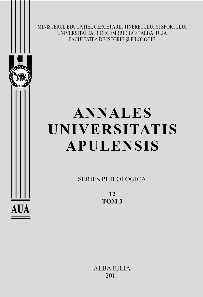Elemente ale comunicării interpersonale din perspectiva clasei de elevi
Aspects of Interpersonal Communication from the Pupils’ Point of View
Author(s): Letitia TrifSubject(s): Cultural Essay, Political Essay, Societal Essay
Published by: Universitatea »1 Decembrie 1918« Alba Iulia
Keywords: interpersonal communication; interpersonal relationships; classroom management; assertiveness; aggressiveness and passivity
Summary/Abstract: In contemporary society there is an important increase of interest in the communication issue, especially in terms of increasing efficiency of communication in interpersonal relationships. Particularising, interpersonal communication – in terms of classroom management, was defined by Level and Galle, 1988 as “a communication of cognitive and affective elements, in order to transmit information, to inspire faith, to induce an emotion, to reveal behaviour through an alternating process of interaction between writing, visual, nonverbal, vocal, auditory, symbolic and behaviour”. (Trif.L., 2008:138) Therefore, assertiveness, aggressiveness and passivity are three qualitatively different ways of approaching interpersonal relations. Each of these has a corresponding set of verbal and nonverbal behaviours. For example, assertiveness promotes interpersonal behaviour in a variant that attempts to maximize personal satisfaction, while taking into account the needs of other people, thus postulating self-respect and respect for others. And, the effectiveness of the communication process is provided by the manifestation of the following skills: active listening – the ability to capture both the content of the message and the speaker’s emotions, in order to ensure the clearest possible understanding of the message; assertive message transmission; identifying sources of conflict and using specific strategies for solving conflicts; using these skills in different communication contexts (dialogue, group communication, direct or mediated communication). Research in this field reveals that training and development of these skills is an ongoing process that requires practice and self-monitoring, while the school context is an auspicious environment for developing these skills.
Journal: Annales Universitatis Apulensis. Series Philologica
- Issue Year: 12/2011
- Issue No: 1
- Page Range: 405-410
- Page Count: 6
- Language: Romanian

